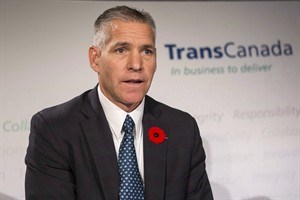
TransCanada's President and CEO Russ Girling says he doesn't see the oil industry's appetite for new pipelines faltering even though crude prices have skidded recently to the lowest in more than five-years. Girling is shown at a news conference in Toronto on Thursday, October 30, 2014. THE CANADIAN PRESS/Chris Young
Republished December 18, 2014 - 1:06 PM
Original Publication Date December 18, 2014 - 3:45 AM
CALGARY - The CEO of TransCanada Corp. (TSX:TRP) says he doesn't see the oil industry's appetite for new pipelines faltering even though crude prices have skidded to the lowest point in more than five-years.
In an interview in his downtown Calgary office, Russ Girling said he's seen ups and downs far more drastic over his career and expects the oilpatch will come out of the latest downturn in reasonably good shape.
"There's a tremendous need to build irrespective of the price of the commodity right now," Girling said.
"We're being pressed to get these facilities online as quickly as we possibly can."
U.S. benchmark crude has fallen by about half since the summer, settling at US$54.11 a barrel on Thursday. In recent weeks, there have been a bevy of announcements from producers signalling that next year's activity in the oilpatch will be subdued.
"I think some have made that connection that, with low oil prices, you might need less infrastructure, but I guess our view would be it's the exact opposite," said Girling, noting that one of the reasons prices are so low is the burgeoning North American oil output, much of which has been moving by rail while pipelines are stalled.
He expects low fuel prices will spur consumer demand. As well, a "silver lining" from the downturn could be lower construction costs for oilsands producers that choose to invest at a low point in the cycle.
Girling said most in the industry see prices of US$80 to US$100 a barrel in the long run, given that world energy demand will continue to grow.
And he points out that when TransCanada first filed its application for Keystone XL in September 2008, it wasn't exactly a good time for the oilpatch, either. After hitting record highs around US$147 that summer, crude prices swiftly cratered below US$40 a barrel as the Great Recession took hold.
"I'm not saying this is easy at all, but the business is resilient and the world is demanding more oil every day," said Girling
Girling said anyone who believes that US$60 oil — even if it's for a year or two — is going to cause the oilsands to come to a screeching halt "hasn't been in this business very long."
"So the notion that somehow as we hit this new low that this business is over in Canada, I think one only needs to look at the last 30 years of production to say that theory doesn't work."
Keith Brooks, clean economy program director at Environmental Defence, disagrees that the oilsands will be developed no matter what.
"It's not inevitable because there are any number of risks and barriers that challenge the plans for the rapid expansion of the tarsands," he said.
Low oil prices are but one headwind for "some of the most expensive oil reserves in the world," said Brooks. On top of that, environmental opposition and legal challenges from First Nations and municipalities are throwing a wrench into plans to build new pipelines to bring oilsands crude to market.
"Clearly, pipelines are one of the constraints on the growth of the sector," he said.
TransCanada has been waiting on a permit to build its Keystone XL pipeline for more than six years. The US$8-billion project would enable 830,000 barrels per day to flow south of the border, connecting with an existing network that today delivers Canadian crude to the U.S. Midwest and Gulf Coast.
Keystone XL would cut diagonally from the Saskatchewan-Montana border to Steele City, Neb. The most recent holdup has centred on a court case in Nebraska over who has the authority to approve the pipeline's route through the state.
Opposition to Keystone XL has been focused on local concerns, such as what would happen if oil were to spill into a key aquifer, as well as on broader issues, such as the pipeline's role in enabling oilsands growth and the resulting increase in greenhouse gas emissions.
Because the pipeline would cross the Canada-U.S. border, it requires presidential approval. So far, President Barack Obama has declined to make a decision, but he's recently expressed skepticism about the project's benefits to the U.S.
Follow @LaurenKrugel on Twitter
News from © The Canadian Press, 2014